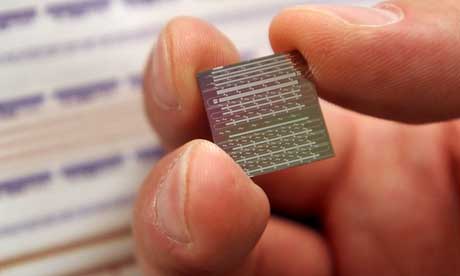
Chip maker Intel says it will fight new allegations of corruption, as it faces a fresh onslaught of claims over its business practices.
The company - which is based in Santa Clara, California - rejected the case brought against it yesterday by New York attorney general Andrew Cuomo and said it would fight the claims in court.
Filing his case against the electronics giant, Cuomo said the company had "used bribery and coercion to maintain a stranglehold on the market", hurting competitors and consumers as a result.
But Intel said the idea that it had damaged the market was incorrect.
"We disagree with the New York attorney general," said the company in a statement. "Neither consumers - who have consistently benefited from lower prices and increased innovation - nor justice are being served by filing a case now. Intel will defend itself."
Intel's language did not, however, directly address the substance of Cuomo's claims – that the company paid billions of dollars in kickbacks to computer manufacturers to get them to use its products instead of those of its main rival, AMD.
Instead, Intel's supporters rallied around to attack Cuomo and the case, putting forward a number of arguments that they believe exculpated the technology pioneer.
Among them was American lobby group the Competitive Enterprise Institute, which takes an anti-regulatory stance and is notorious for suggesting that climate change is not a problem.
Calling Cuomo's case a "baseless attack", CEI official Wayne Crews suggested that Intel's dominance of the lucrative computer chip market was, in fact, proof of its innocence.
"Intel's pricing and rebate policies are legitimate, pro-consumer business practices in a vibrant market setting," he said. "Intel is disciplined not only by its competitors but by downstream business customers like Dell and Hewlett-Packard."
Meanwhile CNBC - the American business news channel that has been accused of blindly cheerleading the activities of corporations> in the past – questioned Cuomo's motives.
"Isn't it strange that this is the second major action filed by Cuomo in the last four days against a California corporate powerhouse?" wrote the network's Silicon Valley chief Jim Goldman yesterday, suggesting that there was a growing "gravy train" of officials looking to gang up on Intel for political benefit.
"Last I checked, Intel-based machines still share shelf space with machines running AMD chips… that prices continue to plunge … and innovation continues to increase… the proof is in the marketplace".
Intel's case is likely to be weakened, however, by previous rulings made by regulators in Europe and Asia that have outlined some of the company's practices and cost it hundreds of millions of dollars in fines.
Officials in Japan and South Korea have acted against the company for offering money to suppliers in order to exclude AMD from the market, while earlier this year European regulators fined the company €1bn for making anti-competitive payments to computer manufacturers.
Intel is still appealing that ruling, but over the summer the European Commission took the unexpected step of publishing some of the documents used as evidence against Intel. Those included email conversations between executives at HP – the largest computer manufacturer in the world – which suggested that they had indeed been paid on the condition that they avoided AMD products.
"You can NOT use the commercial AMD line in the channel in any country, it must be done direct," said one email. "If you do and we get caught (and we will), the Intel money (each month) is gone (they would terminate the deal). The risk is too high."
Ed Black, president of the Computer and Communications Industry Association – which argues that strong anti-competition law is required in the technology industry – said that Intel would be to stop protesting such accusations.
"It is time for Intel to admit its misconduct, repair the harms it has perpetrated and change its business practices," he said. "Its legal strategy is clearly not working and its broad claims of innocence are being shown to be more hollow each passing day."

